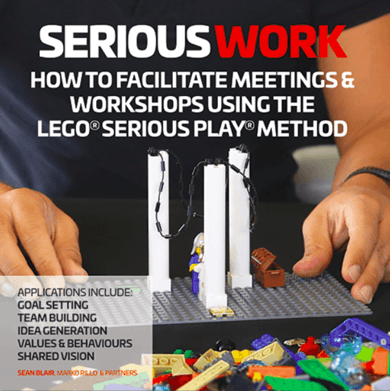What if somebody without formal LEGO SERIOUS PLAY training offers LSP workshops
- This topic has 3 replies, 4 voices, and was last updated 10 years ago by
 Sebastian.
Sebastian.
-
AuthorPosts
-
June 10, 2015 at 12:05 pm #5486
 Marko RilloKeymaster
Marko RilloKeymasterI was recently again pointed to one firm who offers LEGO SERIOUS PLAY workshops, but has not taken formal LEGO SERIOUS PLAY training with any of the senior trainers. So what to think about it?
It would be great to see a debate in this matter. Let me kick off by my own perspective.
I tend to have a democratic stance, based on personal experience. I participated in a conference where Johan Roos told about the roots of LSP and I started experimenting. First I self-educated by reading the working papers, articles and books of Imagination Lab. This allowed to work quite well as a facilitator for years before becoming LSP trained. I just used regular LEGO bricks and my clients were happy with my work, which I did not call “LSP”, but “playful tools in strategy”. In fact – I did not have any idea that LSP was proprietary method during those old days.
Surely eventual LSP training with Per and Jacquie was extremely good as it opened my eyes in many respects regarding the practical aspects of facilitation process. It was a great booster for my facilitation practice, but did not take away the prior satisfaction of the clients.
Training helps, but being a good LSP facilitator relies on constant practice to be “sharp” in facilitation situations which are dynamic, intense and require constant thinking and acting based on rapid reflection on multiple levels of abstraction. Does not matter if you are using bricks or not.
So what to do about the firms who offer LSP without really being formally trained in LSP?
I think that the community should not try to fully control who delivers the service. I guess that the best the community can help to achieve is to popularize positive LSP practices and also point to occasional shortcomings where we see that somebody clearly violates the LSP best practices or trademarks.
There was a recent example where a company had blended “undemocratic” and “LSP” in their value offering, which was absolutely against the philosophy of LSP. There have been some unsolicited uses of LSP training materials or where the facilitators had used LEGO trademarks without permission. Those examples are certainly something that we as a community can point out as an unacceptable and we have to suggest positive alternatives.
However, my personal point of view is that whenever we spot some individuals who do are trying to do their best by starting to offer LSP in their practice, but have not participated in training, we might do the following.
Just congratulate them for the wise choice of entering the fascinating world of LSP, welcome them to our community inclusively and encourage them to train as soon as possible with one of the more experienced LSP trainers so that they could develop their practice further.
Why do I think so? I believe in the world of abundance. There are 500 companies in Fortune 500 and only a fraction of them presently use LSP. :-) What a sea of opportunities!
We have just around 1200 members in our community. However, there are millions of teams and individuals all around the world who might benefit from this wonderful method if we would be able to just spread the word. There are countless project managers, teachers, councilors, coaches, HR managers, quality managers, trustees, innovators, professors, therapists, marketing managers, designers …. etc – who might all be using LEGO SERIOUS PLAY in their practice but we still haven’t managed to get even a fraction of their attention.
So every new participant counts as an invaluable part of our community and would help also the other members to develop our practice and sell better to new groups of people.
What is your take on this?
June 10, 2015 at 2:41 pm #5488 Jeff TagleMember
Jeff TagleMemberpersonally, I have started practicing with the methodology, although I have not been “certified” because of financial and logistical limitations. same with you Marko, most of my knowledge of the LSP method was acquired thru research, reading, and practice. I use it as another element in my toolbox, but I am definitely not teaching the method per se. I don’t think I am competent nor qualified (yet) to do a Train-The-Trainer of LSP.
given that, LSP is considered open source and I hope there’s also a place for facilitators who are still working their way to get formal certification. it is expensive to get certified, but that certainly helps in differentiating one’s self in the consultancy/facilitation field.
June 10, 2015 at 2:49 pm #5490 Eli De FriendMember
Eli De FriendMemberHi Marko,
Thanks for raising this topic. I think your own personal story is a very eloquent one and perhaps significantly more powerful one than my own, which is similar.I learnt about LSP in 2002 from Joyce Miller, who, as a freelance researcher and communications consultant working for the Imagination Lab in Lausanne, had just attended the second official training programme in Billund. I recommended to the CEO of the consulting firm in which I was a member of the senior leadership team, that we try out LSP to support us in our strategy to transition from being an orphaned subsidiary of a French boutique consultancy to that of global headquarters of an international firm. The results were powerful, although not necessarily what was planned and I was seduced. So I started working with Joyce. It wasn’t until 6 years later that I actually got myself trained.
The value of a training programme that leads to certification is that it makes sure that it covers the essentials and more importantly provides a feedback mechanism. Listening to an academic lecture, observing a practitioner or reading a book may all impart knowledge and understanding, but the book does not check the extent of your understanding, nor does the academic professor or the observed practitioner. The trainer is able to observe, provide feedback and observe again until finally satisfied that the knowledge acquirer has attained the right level. This process could also be achieved, perhaps, through a blend of online questionnaires, documented assignments and case studies and some interactive web-based coaching.
So I agree with you that a training programme does not need to be the only away to acquire the skills, but it is one way to attest to the acquisition of the skills and I think that is what we are all most concerned about.
I don’t mind if my neighbour starts up an LSP facilitation practice. In fact, it can only be an advantage to have a neighbour promoting the service that you also sell. This can only contribute to the development of the market.
However, you only need one bad experience with one client to punch a huge whole in the fledgling market, which may never recover. This is why I regularly recommend to new people on this site that should get themselves some formal training. It’s the only way to ensure that the competition selling the same service as I do has a minimum of understanding of what it is selling. This does not guarantee that the service will be delivered successfully, but it reduces the risk.
It is already difficult for many people on this site to sell a consulting approach associated with the LEGO brand. It would be even tougher if the media got hold of examples where charlatans had caused the bankruptcy or suicide of a CEO or business owner.
June 11, 2015 at 7:45 pm #5495 SebastianMember
SebastianMemberHi Eli and Marko,
my 2 cents worth on this.
The ethics of being certified in LEGO Serious Play has become an issue for me also.
Originally I discovered LSP online and then got the open source documents and researched David Gauntlett, and other write ups on LSP. I then ran some workshops using LSP with some success, but then decided to learn more and got certified in late 2012 by Robert Rasmussen.
Being based in Indonesia I had no other certified LSP practitioner around until I discovered Eli De Friend on this website and had a nice chat with him as he and Joyce were based in Jakarta at the time.
As Eli could attest, LSP was a bit of a hard sell in Indonesia due to many factors, unfamiliarity, cost, no local references, etc. Through various marketing maneuvers, I finally got into some doors and have now run maybe 60 workshops for nearly 2000 people in quite large corporations.
My point is that having built the market from near zero, to raising visibility through TV Ads, trade exhibitions, etc, there is quite a raised level of awareness now. Being Indonesia, as ELi can attest, I suddenly find others are now offering LSP to clients. However when I contact Robert re the Association there have been no certification other than myself for Indonesia (this has recently changed).
At the time I found that others from nearby countries were offering Public workshops in Indonesia on LSP and in some instances the content was close to offering the actual methodology. Thinking this was against our certification guidelines I raised it with Robert.
In another instance a local Indonesian representative of a European consultancy that had LSP certification had also begun to run LSP workshops. When asked, the person said that he was not certified but had been given the go ahead by his European principal to run the workshops as they had trained him (they were not master trainers to my knowledge). Another person even was interviewed in an article and claimed as being the sole and first LSP practitioner, again when checked his name was not on the certified list.
This raises 2 points:
1. If I knew I could run Public workshops I would have done so but assumed that it would be against the certification agreement as you would end up teaching them a methodology instead of facilitating a problem solving workshop.2. If as a certified LSP facilitator I was allowed to train others to run workshops I would have done so but assumed this was against the rules as well.
Both points could help me to raise my market reach and revenue.
As Eli and Marko says, having others offer LSP will raise awareness and the market is large. However when you stick to the rules and others can just use Open Source, the LSP book and other sources to run LSP workshops and the client is satisfied there is not really much you can do. Even when they do it wrong and some clients lose faith in LSP, all you can do is sell yourself and your firm as being of main benefit to the client and LSP as merely one of the tools in your toolbox. At the end of the day, the results of your workshop counts and make sure the client remembers you and your firms name first, not LSP.
Cheers
-
AuthorPosts
- You must be logged in to reply to this topic.

 Become a LEGO Serious Play facilitator - check one of the upcoming training events!
Become a LEGO Serious Play facilitator - check one of the upcoming training events!